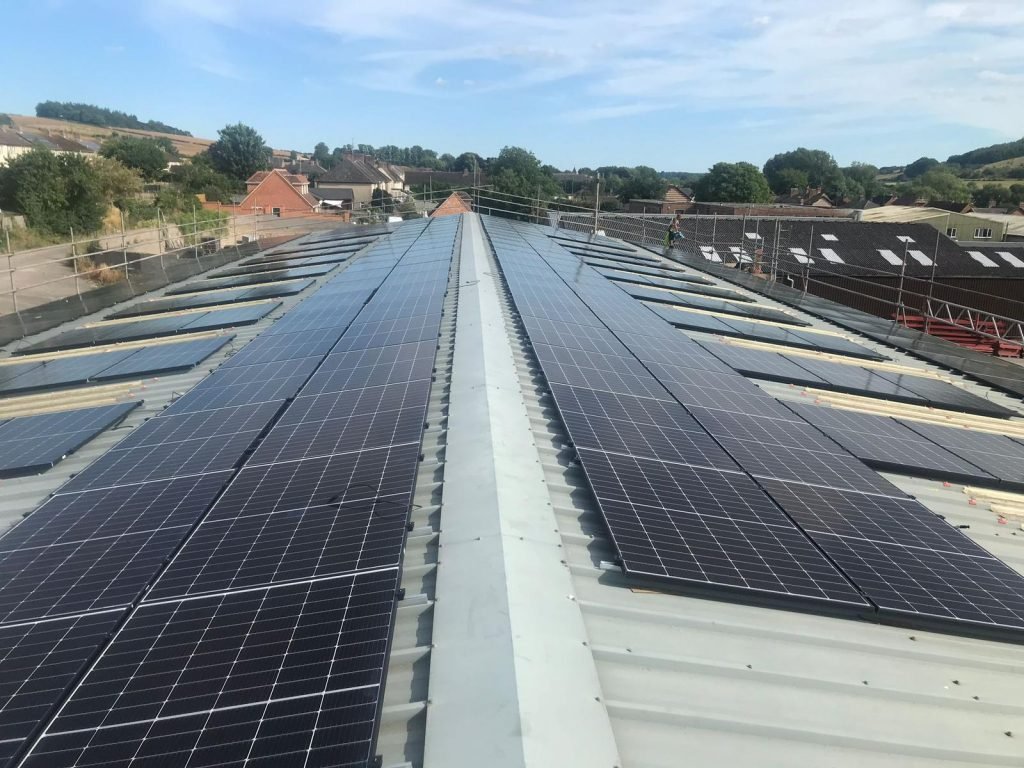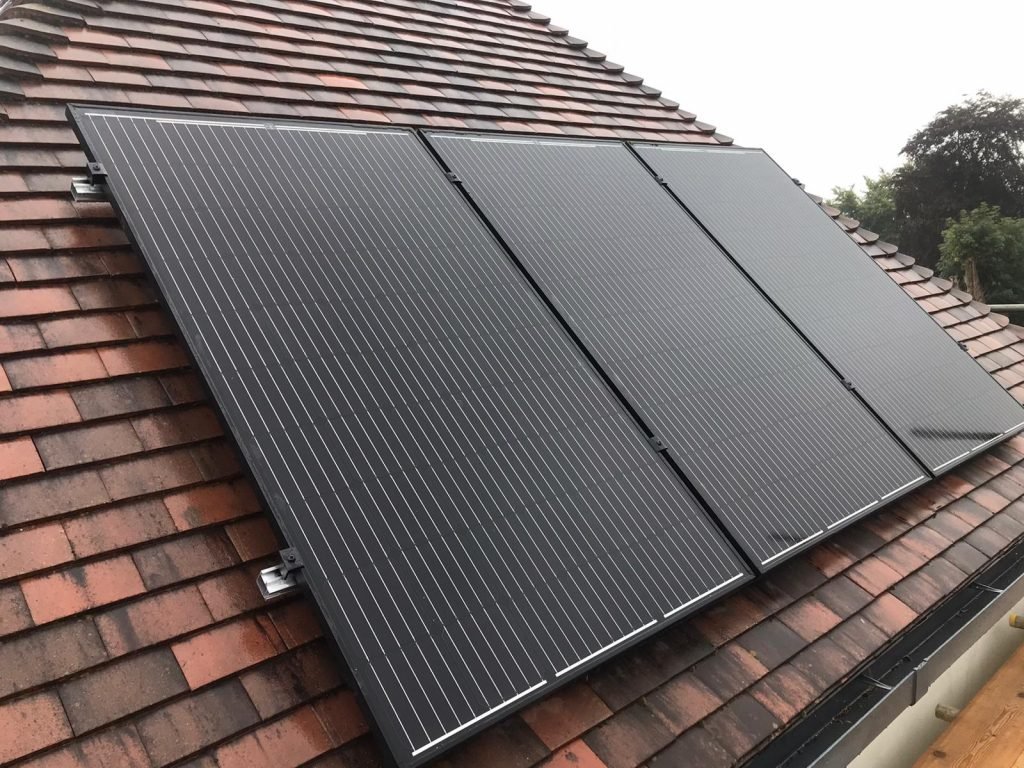Unit 6 Cobham Business Centre Cobham Road Ferndown Industrial Estate Wimborne, Dorset BH21 7BX
Mon-Sat 08:00 AM - 05:00 PM
Unit 6 Cobham Business Centre Cobham Road Ferndown Industrial Estate Wimborne, Dorset BH21 7BX
Mon-Sat 08:00 AM - 05:00 PM
When it comes down to your Solar Panel installation, of course you want to make sure you are installing the best Solar Panels. there are. In general the two most important factors to consider when choosing a Solar Panel is its efficiency and maximum power output.

Why is Solar Panel efficiency important?
Faster payback time
The more efficient your Solar Panels are the more solar energy your PV system is going to produce. The more energy your Solar Panel system is generating, the less energy from the Grid you’ll have to buy. It’s that simple.
For properties with smaller roof or land availability, more efficient solar panels still make solar energy a viable option. A larger panel wattage combined with an efficient solar cell should be enough to still power your home from the sun.
With fewer panels needed to be installed to get the same size system as others, having efficient Solar Panels means that you can save more roof/land space and money on labour. This way you will still be gaining the same amount of solar energy required to power your home.
Who makes the most efficient Solar Panels?
These are the most efficient solar panels for home solar installations as of 2022.
| Brand | Panel Module | Efficiency | Wattage |
| Sunpower | Maxeon 3 | 22.7% | 430W |
| LG | Neon R | 22.3% | 405W |
| Panasonic | EverVolt H | 22.2% | 410W |
| JA Solar | JAM72S30/MR | 21.5% | 555W |
| Trina Solar | Vertex S | 20.8% | 400W |
| Hyundai Energy Solutions | HiE VI Series – HieS400UF |
21.3 | 400W |
| QCell Solar | ML G9+ | 20.3% | 385W-390W |
When exploring solar panels, the panel efficiency rating is always listed on the datasheet. Any solar panel with a maximum efficiency over 20% is a premium solar panel.
Calculating Solar Panel efficiency
To calculate a Solar Panel’s efficiency, scientists test the panel in controlled lab conditions. The Standard Test Conditions (STC) for calculating Solar Panel efficiency aims to see how much solar energy the cells can convert to electricity in a simulated clear 25°C summer’s day, with an irradiance of 1000 W/m2. However, the given maximum efficiency level is not necessarily what the panels will achieve in real-life conditions. Especially as we know the weather isn’t always consistent and certainly not always sunny in the UK.
Fortunately, some Solar Panels are starting to come with a Performance Test Conditions (PTC) rating. A PTC is a more accurate measure of the efficiency of a Solar Panel, as it tells you how the Solar Panel will perform in a variety of climates and conditions. Some manufacturers even go a step further and look into the “system PTC rating”. This takes into account the efficiency of the inverter as well as the Solar Panel as your Solar Panel system’s efficiency is a sum of all its components. So even if you have the most efficient Solar Panel, an inefficient inverter will draw your overall efficiency down.
Solar Panel efficiency calculator
Calculating the efficiency of a Solar Panel is actually rather simple. The formula is as follows:
Efficiency (%) = [Power output of Panel / (Area of panel x Solar Irradiance)] x 100
What factors impact Solar Panel efficiency?
There are three main types of solar cells used in the manufacturing of Solar Panels: Monocrystalline, Polycrystalline and Thin-Film. Each type of solar cell has a different level of efficiency.
So if you are wondering which type of Solar Panel is the most efficient, the answer is easy – monocrystalline. As you will see from our list of the most efficient Solar Panels above, every panel on the list is of monocrystalline cell type.
If you look closely at the surface of a solar panel, you will see a bunch of thin lines. These are a series of copper or aluminium wires, that conduct electricity. Solar Panels which have thinner busbars will be more efficient, as there will be a reduce amount of shading on the cell, allowing the panel to absorb more light. Solar Panel manufacturers which use multi-busbar technology, with utilises multiple ultra-thin busbars, increase the overall Solar Panel’s efficiency. Some solar brands, for example Sunpower, now use Interdigitated Back Contact cells (IBC), which removes all the busbars and wiring from the face of the solar panel to the back, so that more sunlight can be absorbed.
Whilst you may have never considered this a factor, the type of backsheet a Solar Panel has can also affect your panel’s efficiency. For example, having a traditional white backsheet, over an all-black panel, may not necessarily look the part, however will operate slightly more efficiently. This is because an all-black panel will attract more energy from the sun, overheating the panel and affecting its ability to produce electricity. Whilst conventional Solar Panels only have PV cells on one side, you can now install bifacial Solar Panels which has a reflective transparent backsheet to capture more energy. Some manufactures claim that bifacial Solar Panels can even produce up to 30% more energy.
Do Solar Panels lose efficiency over time?

Solar Panel efficiency does decrease over time due to the natural degradation of the solar cells. On average the efficiency of a Solar Panel falls by 0.5% per year. However, most manufactures provide a 25-year performance or “linear output” warranty. This guarantees that the Solar Panel’s output won’t drop below 85% of its original efficiency within the first 25 years.
What else affects Solar Panel efficiency?
There are a few other external factors that can affect the efficiency of your Solar Panel installation. Most of them can be considered and overcome before your Solar PV system is even installed as long as you choose a trusted Solar Panel installer.
Nearby obstructions such as chimneys or trees, can provide enough shade on a Solar Panel to impact it’s efficiency by up to 50%. Before installing a Solar PV system it is important for your chosen installer to carry out a shading analysis to evaluate any potential issues.
In the UK, to receive the most amount of sunlight, it is always recommended that your Solar Panels are installed onto a south facing roof, at a pitch of 30-45 degrees. However, as we know, these ideal conditions can’t always be met. It is important that your energy advisor designs you the best possible layout that matches your energy needs.
A dirty or damaged Solar Panel caused by pesky birds or nearby trees, can reduce your Solar Panel system’s overall efficiency. It is important to keep your PV system well maintained, to check for any irregularities in your energy production, to keep your Solar Panels clean, and protect your system from any birds that may nest underneath them.
Although many may think Solar Panels are less efficient in the winter, it is in-fact extreme heat that can do more damage to your Solar Panels. A well-ventilated Solar Panel will always operate more efficiently than one that isn’t, simply because when the surface of the Solar Panel gets hotter, its efficiency drops. It is for this reason why on-roof Solar Panels are more efficient compared to solar tiles, and integrated Solar Panels. Solar Panels actually operated best in cold, yet sunny conditions.
Are premium efficiency Solar Panels right for you?
At Dorset Electrical Solutions we offer remote assessments and designs to find you the perfect Solar Panel system which is both right for your home and pocket. We install a variety of Solar Panels offering a selection of the most reliable, efficient and cost-effective panels on the UK market. Simple click here and fill out of short form or contact us on 01202 985027 to speak to an energy advisor.